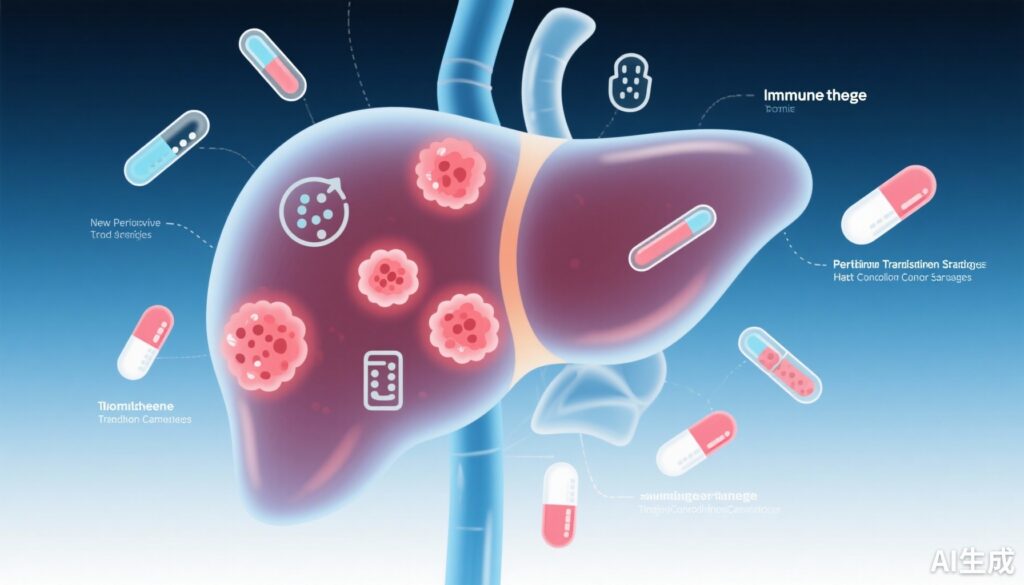Highlight
Perioperative treatment with camrelizumab plus rivoceranib significantly prolongs event-free survival (EFS) in patients with resectable hepatocellular carcinoma (HCC) at intermediate or high risk of recurrence. Major pathological response (MPR) rates substantially increase with combined therapy compared to surgery alone. The combination regimen is associated with manageable safety profiles, supporting its role as a potential new standard in resectable high-risk HCC management.
Study Background
Hepatocellular carcinoma is a leading cause of cancer-related mortality worldwide, with surgical resection remaining a potentially curative option for patients with early-stage or resectable disease. However, high post-surgical recurrence rates, especially in patients with intermediate to high risk of relapse, limit overall survival improvements. Advances in systemic therapies, including immune checkpoint inhibitors and antiangiogenic agents, have revolutionized treatment in advanced HCC stages but have not been well established in the perioperative setting.
The rationale for integrating perioperative immunotherapy and targeted therapy arises from their complementary mechanisms: immune checkpoint inhibition enhances anti-tumor immune responses, while VEGFR2 blockade through rivoceranib impedes tumor angiogenesis, potentially reducing micrometastatic disease and tumor regrowth after surgery. The phase 3 CARES-009 trial was conducted to assess whether this strategy could improve clinical outcomes when combined with curative resection in patients at elevated recurrence risk.
Study Design
CARES-009 is a multicenter, randomized, open-label, phase 3 clinical trial (ClinicalTrials.gov ID: NCT04521153) enrolling 294 patients with resectable hepatocellular carcinoma classified as China liver cancer (CNLC) stage Ib–IIIa. Eligibility criteria included patients with Barcelona Clinic Liver Cancer (BCLC) stage A tumors larger than 5 cm, BCLC stage B, or BCLC stage C without main portal vein invasion or extrahepatic metastases, reflecting an intermediate to high-risk cohort.
Participants were randomized 1:1 to receive either perioperative camrelizumab plus rivoceranib combined with surgery or surgery alone. Stratification factors included CNLC stage and hepatitis B virus (HBV) infection status. The perioperative treatment regimen consisted of two cycles of neoadjuvant camrelizumab (200 mg intravenously every two weeks) with oral rivoceranib (250 mg daily), followed by surgical resection, and then at least six cycles of adjuvant camrelizumab (200 mg every three weeks) plus rivoceranib (250 mg daily).
The surgery arm underwent upfront resection without systemic therapy. The primary endpoint was investigator-assessed event-free survival (EFS) as defined by Response Evaluation Criteria in Solid Tumors version 1.1 (RECIST v1.1). Secondary endpoints included major pathological response (MPR), defined as 50% or fewer viable tumor cells in resected specimens, and overall survival (OS). EFS was also evaluated by a blinded independent review committee (BIRC) to mitigate bias.
Key Findings
At the prespecified interim analysis with a median follow-up of 21.3 months, significant improvements were observed in the perioperative group compared with surgery alone. Median investigator-assessed EFS was markedly prolonged at 42.1 months versus 19.4 months in the control arm (hazard ratio [HR], 0.59; 95% confidence interval [CI], 0.41–0.85; P=0.004). The significance boundary of 0.015 was narrowly missed; however, the P value still denotes strong statistical evidence favoring the intervention.
The blinded independent review corroborated investigator assessments with an HR of 0.63 (95% CI, 0.44–0.90), confirming the robustness of the survival benefit. Importantly, MPR rates were substantially higher in the perioperative arm, with 35.1% achieving MPR compared to 7.5% in the surgery group (P<.001). Pathological complete response, although rare, was seen in 3.4% of patients receiving combined treatment.
Overall survival data remain immature, with only 39 events recorded to date, precluding definitive conclusions on survival benefit. Safety analysis revealed grade 3 or higher treatment-related adverse events in 37.6% of patients treated with camrelizumab plus rivoceranib. These toxicities were consistent with known profiles of immune checkpoint inhibitors and VEGFR2 inhibitors and were deemed manageable within the perioperative context.
Expert Commentary
The CARES-009 trial presents significant progress in perioperative management of resectable HCC at intermediate or high risk of recurrence. The observed improvement in EFS and the high MPR rates suggest meaningful tumor control beyond surgery alone, highlighting the potential of neoadjuvant plus adjuvant immune-targeted therapy combinations.
From a mechanistic standpoint, camrelizumab’s PD-1 blockade may reinvigorate exhausted T cells within the tumor microenvironment facilitating immune-mediated tumor clearance, while rivoceranib’s inhibition of VEGFR2 not only disrupts angiogenesis but may also normalize tumor vasculature, enhancing immune cell infiltration. This dual effect likely underpins the synergistic impact on pathological response and survival outcomes.
Nonetheless, certain limitations merit consideration. The relatively short median follow-up necessitates caution when interpreting long-term efficacy and safety. Furthermore, generalizability beyond populations with hepatitis B virus-associated HCC and different etiological backgrounds requires further investigation. Finally, overall survival data maturation and quality of life assessments will be critical to fully define the therapeutic value of this approach.
Conclusion
The phase 3 CARES-009 trial provides compelling evidence that perioperative camrelizumab combined with rivoceranib significantly improves event-free survival and major pathological response rates compared with surgery alone in patients with resectable HCC at intermediate or high risk for recurrence. These findings support incorporation of perioperative immunotherapy plus targeted therapy into the treatment paradigm for selected patients, potentially transforming the management of high-risk resectable HCC.
Future research directions include longer follow-up for overall survival analysis, evaluation in broader patient populations, and exploration of biomarker-driven strategies to personalize perioperative interventions.
Funding and Clinical Trials
The CARES-009 trial was sponsored by investigators in collaboration with pharmaceutical partners developing camrelizumab and rivoceranib. The trial is registered at ClinicalTrials.gov under the identifier NCT04521153.
References
1. Zhou J, et al. Perioperative camrelizumab plus rivoceranib versus surgery alone for resectable hepatocellular carcinoma at intermediate or high risk of recurrence: phase 3 CARES-009 trial. Presented at the European Society for Medical Oncology (ESMO) Congress 2025; October 17-21, 2025. Abstract #1470O.
2. Llovet JM, et al. Hepatocellular carcinoma. Nat Rev Dis Primers. 2021 Feb 25;7(1):6.
3. Finn RS, et al. Atezolizumab plus bevacizumab in unresectable hepatocellular carcinoma. N Engl J Med. 2020 May 14;382(20):1894-1905.



